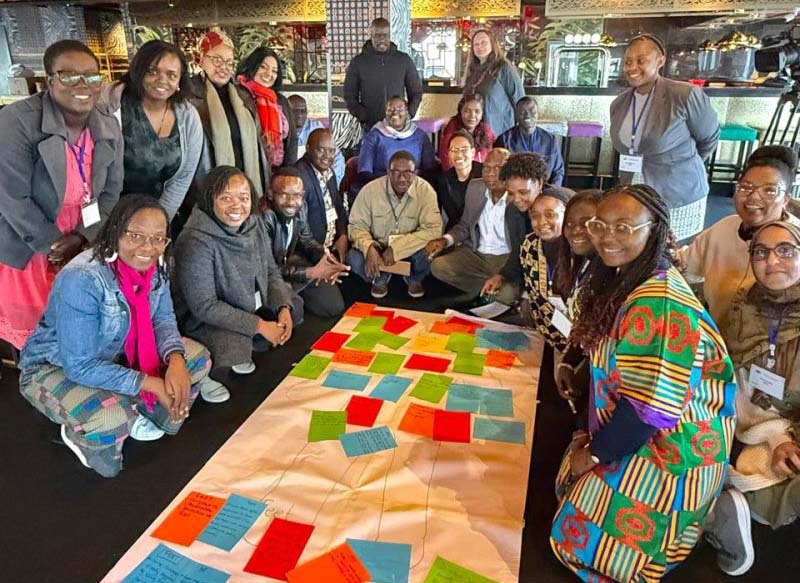SGCI News
The Human Sciences Research Council (HSRC) hosts the Science Granting Councils Initiative (SGCI) Gender Equality and Inclusion (GEI) learning summit and calls for a more inclusive research landscape. The event…
The Human Sciences Research Council (HSRC) hosts the Science Granting Councils Initiative (SGCI) Gender Equality and Inclusion (GEI) learning summit and calls for a more inclusive research landscape.
The event marked the culmination of a three-year project aimed at embedding gender equity and inclusivity into funding practices across 13 African countries.
The summit, which took place from June 24-26, 2025, in South Africa, brought together representatives from science granting councils, research institutions, and organisations to share experiences, challenges, and successes in promoting gender equality and inclusion in research.
The summit was a platform for building momentum, deepening collaboration, and celebrating the collective commitment to creating a more inclusive research landscape across the continent.
Over the three days, participants engaged in candid conversations, shared practical tools for change, and explored ways to prioritise rural, disabled, and minority women in research.
Highlights from the summit
Day one of the summit set the tone for the week, with grounded presentations on embedding gender equity into grant-making processes, discussions on intersectionality, and explorations of challenges and opportunities for women in STEM.

The keynote presentation by UNESCO’s Rovani Sigamoney resonated with many, emphasising that closing the gender gap is not charity, but a smart investment.
On day two, representatives from Namibia and Uganda shared their experiences in embedding gender equity and intersectionality into their national research ecosystems.
Namibia is ranked eighth globally for GEI. The Namibia National Commission on Research, Science and Technology discussed its efforts to assess perceptions and uncover hidden barriers within its grant management system.
They aim to strengthen capacity, build a gender integration framework, and develop monitoring indicators that turn evidence into policy.
The Uganda National Council for Science and Technology is tackling deep disparities in its research landscape. With 81 per cent of research led by urban-based institutions, and just 28 per cent of principal investigators being women.
The team is undertaking a national study focused on female doctoral holders. Their approach combines data cleaning, capacity building, and a 3G framework (gender, geography, generation) to promote real institutional change.
Challenges and opportunities
The summit also shed light on the cultural and everyday realities that often go unnoticed in research, including how women’s participation in research is hindered by societal expectations, cultural practices, and a lack of support.
Participants emphasised the need for research to account for the women, rather than designing solutions that exclude them.
Dorothy Ngila, director of knowledge and Institutional networks at the National Research Foundation of South Africa, reflected on the journey so far, emphasising that lasting transformation does not start with funding, but with conviction.
“It is not so much about the funding. Once you start moving away from ‘how much money do I have,’ there is a lot of change that needs to take place.”
Nompumelelo Zungu from the HSRC posed a critical question: “Do we just lie down and reverse ten years of gender work? Or do we become activists and ensure that we do not undo what we have done?”
A call to action
The summit highlighted the need for continued commitment to prioritising gender in research, particularly in the face of funding cuts and pressure on gender research.
Leonora Tima from GRIT – Gender Rights in Tech (formerly Kwanele South Africa) shared real-world solutions, including a feminist internet built on consent, care, participation, and protection, and tech that is community-led, trauma-informed, and locally grounded.
The HSRC calls on all stakeholders to use the momentum from this summit to renew their commitment to promoting gender equality and inclusion in research.
As Zungu emphasised, the work continues, and it is up to individuals, institutions, and organisations to ensure that progress is not undone.
By working together, we can build a more inclusive research landscape that truly reflects the needs and experiences of all individuals, Zungu said.
Please check out the stories and let us know what you think. We would love to hear from you.
Let’s continue the conversation on our social media
Written by Jackie Opara
Related News
Voices of SGCI: Council leaders on the direction and ambition of SGCI 3
At the African Union’s Science, Technology and Innovation Week in Addis Ababa, earlier this month, leaders of science granting councils reflected on what SGCI Phase 3 represents for Africa’s science and innovation systems. From ownership and alignment to stewardship and sustainability, here are their voices…
Building Africa’s science future: inside the SGCI alliance
As Phase 3 of the Science Granting Councils Initiative launches on the margins of the African Union Summit in Addis Ababa last week, the SGCI Alliance Chair explains why this moment marks a decisive turning point for African science. Cephas Adjei Mensah describes what is…
Open call: Support for science granting councils in Sub-Saharan Africa
The International Development Research Centre (IDRC), through the Science Granting Councils Initiative (SGCI), has launched a call for proposals to support science granting councils in Sub-Saharan Africa in the establishment and operationalisation of the Capacity Strengthening Hub under Phase III of the SGCI-3. The Hub…
SGCI funded projects
Rwanda’s integrated approach to sustainable agriculture and nutrition
Project Titles & Institution Areas of Research Number of Projects being funded Project Duration Grant Amount In-Kind Distribution Council Collaboration with other councils





